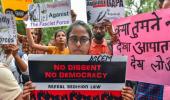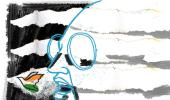In a landmark order, the Supreme Court on Wednesday put on hold the contentious sedition law till the Centre completes its promised review of the colonial relic and also asked the central and state governments not to register any fresh cases invoking the offence.

A bench headed by Chief Justice of India N V Ramana directed that ongoing probes, pending trials and all proceedings under the sedition law across the country will also be kept in abeyance, Those in jail on sedition charges could approach the court for bail, it said.
Delivering its 10-page order after it gave 24 hours to the Centre to spell out its stand on keeping the pending sedition cases in abeyance and not registering fresh cases till the government's re-examination of the penal law is over, the court also spoke of the need to balance the interests of civil liberties and citizens with that of the State.
“This court is cognizant of security interests and integrity of the State on one hand, and the civil liberties of citizens on the other. There is a requirement to balance both sets of considerations, which is a difficult exercise."
The offence of sedition, which was included in Section 124 A of the Indian Penal Code in 1890, has been under intense public scrutiny for its use as a tool against expressions of dissent, including on social media. The British government during its colonial rule had used the sedition law primarily to suppress dissent and imprison freedom fighters such as Mahatma Gandhi and Bal Gangadhar Tilak.
“The case of the petitioners is that this provision of law… pre-dates the Constitution itself, and is being misused…,” the bench, also comprising Justices Surya Kant and Hima Kohli, said in its interim order.
Taking note of the concerns of the Centre, the apex court said the “rigours of Section 124 A (sedition) of the IPC is not in tune with the current social milieu” and permitted reconsideration of the provision.
“We expect that, till the re-examination of the provision is complete, it will be appropriate not to continue the usage of the aforesaid provision of law by the Governments."
Any affected party is at liberty to approach concerned courts, which are requested to examine the reliefs sought taking into the consideration the present order, the apex court said.
CJI Ramana, writing the order, referred to the attorney general (K K Venugopal) earlier giving instances of “glaring misuse of this provision, like in the case of recital of the Hanuman Chalisa”.
The Editors Guild of India welcomed the court order.
“The Guild welcomes this interim order as sedition law has been used far too often by central and state governments against journalists in an effort to curb independent reporting,” it said in a statement.
The Guild was one of the petitioners who had challenged the sedition law. The other petitioners included Major General (Retd) SG Vombatkere, former union minister Arun Shourie and People's Union for Civil Liberties.
The petitions contended that the law causes a 'chilling effect' on free speech and is an unreasonable restriction on free expression, a fundamental right.
"We are looking for the entire (sedition) law to be struck down," Vombatkere told NDTV.
Senior advocate and former Attorney General Mukul Rohatgi told the channel that the sedition law has outlived its life and that the apex court order was a "very bold step".
The court listed the pleas for further hearing in the third week of July, and said its directions shall continue till further orders.
While the Opposition hailed the decision, saying the voice of truth can no longer be suppressed, the Centre invoked the "Lakshman Rekha" to assert that none of the institutions should not cross the "boundary".
The ruling BJP on its part said the order must be viewed in the context of the overall positive suggestion of the government that it wishes to examine the matter which has been "duly accepted" by the court.
The offence of sedition provides for life term as maximum penalty for creating "disaffection towards the government".
Over the years, the number of sedition cases has been on the rise, with Maharashtra politician couple Navneet and Ravi Rana, author Arundhati Roy, student activist Umar Khalid and journalist Siddique Kappan among those charged under the provision.
“The British brought sedition laws to target freedom fighters. A sedition charge was imposed on us just for reciting Hanuman Chalisa. We got justice from the Supreme Court today. I thank the court, the law minister, and the prime minister for this,” said Navneet Rana, a Lok Sabha MP from Amravati.
The court order referred to the Centre's affidavit, which accepted there were divergent views on the law and had also said that Prime Minister Narendra Modi was strongly in favour of protection of civil liberties and respect for human rights.
“In view of the above, it is clear that the Union of India agrees with the prima facie opinion expressed by this Court… In light of the same, the Union of India may reconsider the aforesaid provision of law."
The order said the interim stay granted to some petitioners by the apex court would continue to operate till further orders.
“All pending trials, appeals and proceedings with respect to the charge framed under Section 124 A of IPC be kept in abeyance. Adjudication with respect to other Sections, if any, could proceed if the Courts are of the opinion that no prejudice would be caused to the accused,” it added.
If any fresh case is registered, the affected parties are at liberty to approach the courts for appropriate relief and the courts are requested to examine the reliefs sought, taking into account the present order passed as well as the clear stand taken by the Centre, it said.
The court did not agree with the Centre's suggestion that a superintendent of police ranked officer be made responsible for monitoring the registration of FIRs for the offence of sedition.
Solicitor General Tushar Mehta, appearing for the Centre, had also said the registration of FIRs on the matter cannot be prevented as the provision dealt with a cognisable offence and was upheld by a Constitution bench in 1962.
With regard to pending sedition cases, the Centre suggested that hearing on bail pleas in such matters may be expedited as the government did not know the gravity of the offence in all the cases and they may have terror or money laundering angles.
"Ultimately, pending cases are before the judicial forum and we need to trust courts," the law officer submitted.
The bench, which rose for a few minutes to discuss the orders after taking note of the Centre's response, came back to pronounce the directions and said it has considered the issues elaborately.
Between 2015 and 2020, 356 cases of sedition -- as defined under Section 124 A of the IPC--were registered and 548 persons arrested, according to data compiled by the National Crime Records Bureau.
However, just 12 persons arrested in seven sedition cases were convicted in this six-year period.
1890: Sedition was included as an offence under section 124A IPC through the Special Act XVII.
1897: Freedom fighter Bal Gangadhar Tilak was famously in the dock in a sedition trial.
Jan 20, 1962: A five-judge constitution bench delivers a historic verdict in the Kedar Nath Singh case, upholds validity of sedition law, attempts to restrict scope of its misuse.
It holds unless accompanied by incitement or a call for violence, the criticism of the government cannot be construed as a seditious offence.
July 15, 2021: CJI N V Ramana-led bench issues notice to Centre on pleas challenging validity of provision.
April 27, 2022: SC issues notice to Centre on other pleas, grants time to Solicitor General to file response.
May 5, 2022: SC says it would hear arguments on May 10 on legal question if pleas challenging sedition law be referred to a larger bench.
May 7, 2022: SG defends sedition law and the 1962 verdict of a constitution bench upholding its validity.
The written statement says the law and verdict have withstood "the test of time" about six decades.
May 9: MHA files affidavit, refers to PM's views on the issue. It urges SC not to invest time in examining the validity of sedition law. It says the “competent forum” would decide the issue.
May 10: SC agrees to Centre's view that an appropriate forum would reconsider sedition law, but seeks views on protection of citizens' interest in future, present sedition cases.
May 11, 2022: A three-judge bench permits Centre to reconsider laws and till the re-examination, puts the provision, the FIRs and consequential proceedings at abeyance. Fixes pleas for further hearing in the third week of July.












 © 2025
© 2025